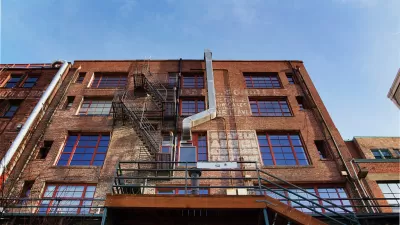Isolating poor residents from rich ones is not only bad for those being segregated, it leads to the worst outcomes for a city as a whole. Fighting displacement results in less crime and more stable and healthy communities.
Miriam Axel-Lute, Shelterforce editor, comments on a recent blog post from John Roman of the Urban Institute's Metrotrends Blog on Rooflines. Roman says that if you consider crime and violence to be contagious issues, "having prosperous, and therefore presumably less susceptable [sic] to contagion, areas abutting poorer areas will slow the spread of crime, and therefore the total amount of it in a larger area."
While Axel-Lute agrees with the general idea, she adds that this thinking inevitably leads to larger discussions regarding displacement that must be addressed. She asks "what happens if you create a tipping point by various actions to reduce crime in the 'infected' area such that some people with means move in, but take measures to ensure those who are already there and want to stay are not displaced?"
FULL STORY: Fighting Displacement Fights Crime

Maui's Vacation Rental Debate Turns Ugly
Verbal attacks, misinformation campaigns and fistfights plague a high-stakes debate to convert thousands of vacation rentals into long-term housing.

Planetizen Federal Action Tracker
A weekly monitor of how Trump’s orders and actions are impacting planners and planning in America.

San Francisco Suspends Traffic Calming Amidst Record Deaths
Citing “a challenging fiscal landscape,” the city will cease the program on the heels of 42 traffic deaths, including 24 pedestrians.

Defunct Pittsburgh Power Plant to Become Residential Tower
A decommissioned steam heat plant will be redeveloped into almost 100 affordable housing units.

Trump Prompts Restructuring of Transportation Research Board in “Unprecedented Overreach”
The TRB has eliminated more than half of its committees including those focused on climate, equity, and cities.

Amtrak Rolls Out New Orleans to Alabama “Mardi Gras” Train
The new service will operate morning and evening departures between Mobile and New Orleans.
Urban Design for Planners 1: Software Tools
This six-course series explores essential urban design concepts using open source software and equips planners with the tools they need to participate fully in the urban design process.
Planning for Universal Design
Learn the tools for implementing Universal Design in planning regulations.
Heyer Gruel & Associates PA
JM Goldson LLC
Custer County Colorado
City of Camden Redevelopment Agency
City of Astoria
Transportation Research & Education Center (TREC) at Portland State University
Jefferson Parish Government
Camden Redevelopment Agency
City of Claremont




























